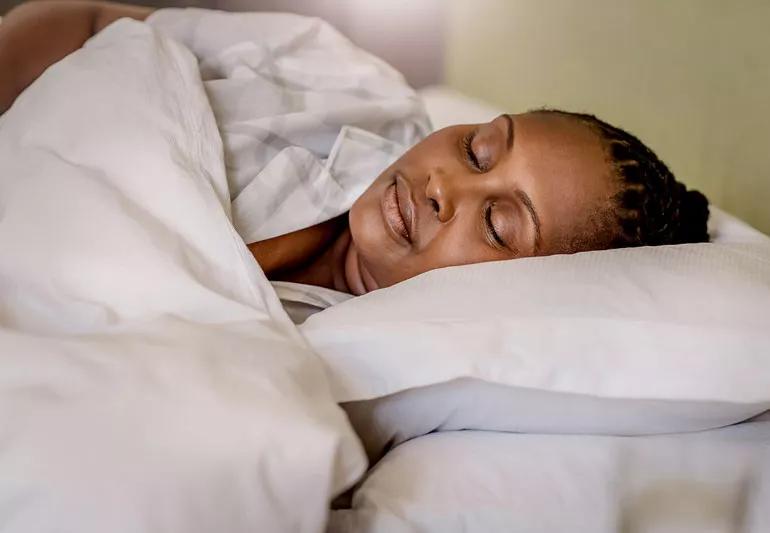What’s the Best Temperature for Sleep?
Which category of “sleeper” do you fall into? While some people like to keep their bedrooms cool because they “sleep hot,” others prefer to crank up the bedroom temperature because they “sleep cold.”
It can pose for an interesting debate — especially if you’re sharing a bed/bedroom with someone who doesn’t quite vibe with your sleep style. But it is possible to find a healthy and happy medium.
As a rule of thumb, sleep psychologist Michelle Drwrup, PsyD, says to keep your bedroom at 60 to 67° F (15 to 19° C) and to think of your bedroom as your ‘cave.’ “It should be cool, dark and quiet to enhance your sleep.”
So, how exactly does temperature affect your sleep? Learn about the health implications of sleeping too hot or too cold and what your ideal sleeping temperature should be, below.
How temperature impacts sleep
We’ve all experienced a terrible night’s sleep. We wake up the next day feeling groggy and moody, moving slowly and looking forward to the moment we can once again shut our eyes and get some rest.
There are several factors that can contribute to sleeping troubles, one being temperature.
“If your bedroom becomes uncomfortably hot or cold, you are more likely to wake up,” says Dr. Drerup.
But why is this the case? One study shares that too much heat or cold exposure is directly linked to increased wakefulness and decreased rapid eye movement (REM) sleep (the stage in which one dreams). “Thermoregulation is very important for staying in restorative, slow-wave sleep stages,” says Dr. Drerup. “These are the stages in which we get the most rest.”
Sleeping too hot
When we sleep, our core body temperature decreases as part of the sleep initiation process, so you may crave the heat to get warm and cozy under the covers. But — if the temperature of your bedroom is too hot or humid, chances are you’ll experience more restlessness and have more trouble falling/staying asleep.
“Heat is a huge disruptor for REM sleep,” Dr. Drerup says. With the heat of the room, your body temperature will also rise, thus undoing the sleep initiation process entirely.
If your bedroom temperature is above 70° F, it’s too hot.
Sleeping too cold
On the flip side, sleeping too cold also has its downsides. It may not affect your sleep cycles as drastically as sleeping too hot, but it may lead to other health issues.
“When we’re cold, our body kicks into high gear to try and get us warm again,” says Dr. Drerup. Blood vessels become constricted, breathing becomes shallow and it puts extra pressure on our cardiovascular system to get our body temperatures regulated again, she adds.
If your bedroom temperature is lower than 60° F, it’s too cold.
Does ideal sleep temperature change with age?
As we age, our bodies go through many changes — one, being a decrease in body temperature and another being a decrease in melatonin (a hormone released at night associated with sleep control) and cortisol (stress hormone) levels. You may need to adjust your sleeping temperature depending on your body, but you should avoid changing it too drastically one way or the other. Talk with your doctor to see if your sleep temperature should change.
So, now that you know it’s not ideal to sleep in too hot or too cold of temperatures, what is the best sleeping temperature? “Typically it is suggested that the optimal sleeping temperature in the bedroom for adults should be between 60 and 67° F,” says Dr. Drerup. This range of temperature is thought to actually help facilitate the stability of REM sleep.
What is the ideal sleeping temperature for babies?
The best sleeping temperature for babies and toddlers is a bit higher, between 65 and 70° F.
“Sleeping on the warmer end of the ideal sleep temperature scale is more conducive for those with smaller bodies that are still developing,” says Dr. Drerup. “They are not yet able to regulate their body temperature like adults can.”
Keep your baby’s bedroom temperature too warm though, and you run the risk of overheating. Put your child in something breathable to sleep in and try to limit the number of blankets in their crib/bed.
If you’re concerned about your child being too hot while they sleep, touch the back of their neck or stomach to test your theory. If their skin is sweaty, remove a layer or decrease the temperature of the room a bit.
How to keep the ideal sleep temperature
Before you head to bed tonight, set your thermostat to the optimal sleeping temperature (60 to 67° F) and try these other tips for getting a good night’s rest:
- Keep a fan in your room, so that in the case you do feel too warm, it will be easy to cool down the rest of the room.
- Avoid drinking caffeine or eating foods high in sugar (which can increase your body temperature).
- Sleep for the season, with appropriate, breathable pajamas, bed sheets and blankets.
Now it’s time to put your temperature regulations to the test! If you’re still experiencing sleep issues at a regulated temperature, consult with your primary doctor, who can refer you to a sleep psychologist.
© Cleveland Clinic


Comments
Post a Comment